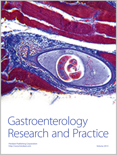
Gastroenterology Research and Practice
Scope & Guideline
Elevating Standards in Gastrointestinal Research
Introduction
Aims and Scopes
- Gastrointestinal Disorders and Treatments:
The journal publishes research on a variety of gastrointestinal disorders, including but not limited to inflammatory bowel disease, liver diseases, gastrointestinal cancers, and functional gastrointestinal disorders. This encompasses studies on the etiology, pathophysiology, and treatment options available. - Innovative Diagnostic Techniques:
A significant focus is placed on the development and evaluation of new diagnostic techniques and technologies, such as endoscopic procedures, imaging techniques, and biomarkers for early detection of gastrointestinal diseases. - Multidisciplinary Approaches to Care:
The journal encourages research that adopts a multidisciplinary approach to gastrointestinal health, integrating insights from surgery, pharmacology, nutrition, and microbiology, particularly the role of gut microbiota in health and disease. - Clinical Trials and Evidence-Based Studies:
The publication regularly features clinical trials and systematic reviews that provide evidence-based insights into the efficacy and safety of various therapeutic strategies, ranging from pharmacological treatments to surgical interventions. - Traditional and Complementary Medicine:
There is an increasing interest in studies exploring the role of traditional and complementary medicine, particularly in the management of gastrointestinal disorders, highlighting the integration of these practices into modern healthcare.
Trending and Emerging
- Gut Microbiota Research:
There is a growing emphasis on the role of gut microbiota in gastrointestinal health and disease, with studies exploring how microbiome composition affects conditions like inflammatory bowel disease and colorectal cancer. - Artificial Intelligence and Technology in Endoscopy:
The integration of artificial intelligence and advanced technologies in endoscopic procedures is trending, with research focused on improving diagnostic accuracy and procedural efficiency. - Patient-Centered Care and Quality of Life:
An increasing focus on patient-reported outcomes and quality of life measures in gastroenterology research is emerging, emphasizing the importance of holistic patient care. - Personalized Medicine Approaches:
Research in personalized medicine, particularly the tailoring of treatments based on genetic and molecular profiling of patients, is on the rise, indicating a shift towards more individualized treatment strategies. - Telemedicine in Gastroenterology:
The rise of telemedicine and remote patient monitoring has gained attention, especially in the context of managing chronic gastrointestinal conditions, reflecting a broader trend towards digital health solutions.
Declining or Waning
- Conventional Surgical Techniques:
There appears to be a decrease in the publication of studies centered around conventional surgical techniques for gastrointestinal conditions, as newer minimally invasive and endoscopic methods gain prominence. - Basic Science Research:
Research that focuses solely on basic science without a clinical application is diminishing. The journal has shifted towards more clinically relevant studies that directly impact patient care. - Epidemiological Studies:
The frequency of epidemiological studies focusing on the prevalence of gastrointestinal diseases seems to be decreasing, possibly due to a shift towards more intervention-focused research. - Single-Center Studies:
There is a noticeable decline in single-center studies as the journal increasingly favors multicenter and larger cohort studies that provide more generalizable results. - Traditional Dietary Interventions:
Research specifically centered on traditional dietary interventions for gastrointestinal disorders is becoming less common, perhaps due to a growing emphasis on evidence-based pharmacological treatments.
Similar Journals

WORLD JOURNAL OF GASTROENTEROLOGY
Unveiling the latest in digestive health advancements.WORLD JOURNAL OF GASTROENTEROLOGY, published by BAISHIDENG PUBLISHING GROUP INC, stands at the forefront of gastrointestinal research, providing a critical platform for the dissemination of high-quality studies in the field. With an impressive impact factor reflected in its Q1 rankings in both Gastroenterology and Miscellaneous Medicine, this journal is recognized for its rigorous peer-review process and commitment to advancing knowledge and practices related to digestive health. Covering comprehensive scopes from clinical advancements to innovative therapies, the journal serves an essential role for researchers, clinicians, and students, enabling them to stay updated on the latest developments and findings from 1998 through 2024. The open access model facilitates broader accessibility, ensuring that groundbreaking research reaches a global audience. The journal's ranking within the top 15% of Scopus demonstrates its significant contribution to the academic community, making it a valuable resource for advancing the science of gastroenterology.

Minerva Gastroenterology
Unlocking the Future of Gastroenterology ResearchMinerva Gastroenterology, published by EDIZIONI MINERVA MEDICA, is a notable academic journal dedicated to advancing the field of gastroenterology and related disciplines. With an ISSN of 2724-5985 and an E-ISSN of 2724-5365, this journal gathers innovative research from diverse areas including internal medicine, endocrinology, and metabolism. Though characterized by its open-access policies, Minerva Gastroenterology aims to provide a platform for high-quality scholarly articles with an emphasis on critical reviews, clinical studies, and translational research. Since its inception in 2021, the journal has managed to secure a reputation reflected in its Q3 rank across multiple categories in 2023, as well as its standing in Scopus rankings, positioning it in the 45th to 47th percentile among renowned medical journals. Situated in Turin, Italy, it fosters collaboration and knowledge-sharing among researchers and practitioners, making it an essential resource for those seeking to deepen their understanding of gastroenterological conditions and enhance clinical practices.
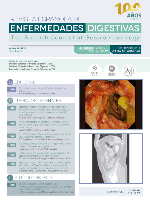
REVISTA ESPANOLA DE ENFERMEDADES DIGESTIVAS
Elevating clinical practices through open access knowledge.REVISTA ESPANOLA DE ENFERMEDADES DIGESTIVAS, a pivotal Open Access journal published by ARAN EDICIONES, S A, has been at the forefront of advancing the field of gastroenterology since its inception in 1990. With a robust commitment to disseminating high-quality research, the journal provides a platform for researchers, clinicians, and students to share innovative findings and insights concerning digestive diseases. The journal is characterized by its Q3 ranking in both Gastroenterology and Miscellaneous Medicine categories, indicative of its significant contributions to these fields, and is positioned within the 36th percentile of Scopus rankings for medicine related to gastroenterology. Based in Spain, REVISTA ESPANOLA DE ENFERMEDADES DIGESTIVAS has embraced the Open Access model since 2004, ensuring that its articles are readily available to a global audience without financial barriers. The journal not only supports academic discourse but also plays a crucial role in improving clinical practices and health outcomes related to digestive health.
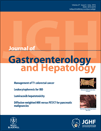
JOURNAL OF GASTROENTEROLOGY AND HEPATOLOGY
Uncovering the latest in digestive health advancements.Welcome to the JOURNAL OF GASTROENTEROLOGY AND HEPATOLOGY, an esteemed publication in the field of gastroenterology and hepatology, proudly published by WILEY. Established in 1986, this journal serves as a crucial platform for researchers, healthcare professionals, and students, presenting groundbreaking research and comprehensive reviews that drive advances in understanding and treating gastrointestinal and liver diseases. With a strong reputation evidenced by its Q1 ranking in gastroenterology and Q2 ranking in hepatology, this journal ranks impressively in the Scopus metrics - positioned at #22 out of 167 in gastroenterology and #21 out of 82 in hepatology, reflecting its contribution to scholarly excellence. Although it does not offer open access options, the journal’s rich archive and diverse topics make it indispensable for those dedicated to improving patient outcomes in these critical areas of medicine. Whether you are a seasoned researcher or an aspiring medical professional, engaging with this journal will keep you at the forefront of the latest developments and emerging trends in gastroenterology and hepatology research.
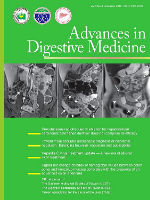
Advances in Digestive Medicine
Innovating the Future of Digestive MedicineAdvances in Digestive Medicine is a premier scholarly journal dedicated to the evolving field of gastrointestinal health and diseases. Published by WILEY, this journal aims to disseminate high-quality research encompassing a wide range of topics related to digestive medicine, from foundational studies to innovative clinical applications. As a significant resource for researchers, professionals, and students alike, Advances in Digestive Medicine fosters a deeper understanding of digestive disorders, promoting collaboration and knowledge exchange within the scientific community. Although it offers subscription-based access, the journal ensures comprehensive coverage of groundbreaking studies that significantly impact clinical practice and patient care in the field. With an ISSN of 2351-9797 and an E-ISSN of 2351-9800, it stands as an essential platform for anyone involved in digestive health research.

EUROPEAN JOURNAL OF GASTROENTEROLOGY & HEPATOLOGY
Pioneering research for a healthier future.The EUROPEAN JOURNAL OF GASTROENTEROLOGY & HEPATOLOGY, published by LIPPINCOTT WILLIAMS & WILKINS, serves as a key platform for disseminating cutting-edge research in the fields of gastroenterology and hepatology since its inception in 1989. With its ISSN 0954-691X and E-ISSN 1473-5687, the journal has established a prominent reputation, as reflected in its 2023 rankings, placing it in Q2 for Gastroenterology and Q3 for Hepatology. It is ranked #75 out of 167 in gastroenterology and #39 out of 82 in hepatology according to Scopus, highlighting its importance in advancing knowledge and clinical practices. While it does not currently offer open access options, the journal remains essential for researchers, healthcare professionals, and students seeking to stay abreast of significant developments and innovations in digestive health. By providing rigorous peer-reviewed articles, the EUROPEAN JOURNAL OF GASTROENTEROLOGY & HEPATOLOGY continues to contribute to the understanding and treatment of gastrointestinal and liver diseases, making it a vital resource in the medical community.
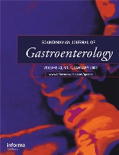
SCANDINAVIAN JOURNAL OF GASTROENTEROLOGY
Unlocking New Frontiers in Digestive Health ResearchSCANDINAVIAN JOURNAL OF GASTROENTEROLOGY, published by Taylor & Francis Ltd, is a leading journal in the field of gastroenterology, dedicated to advancing clinical and experimental research related to digestive health. With an ISSN of 0036-5521 and an E-ISSN of 1502-7708, this journal provides a platform for high-quality research that addresses the complexities of gastrointestinal diseases. Since its inception in 1966, the journal has consistently contributed valuable insights and is currently categorized in the Q2 quartile of gastroenterology journals, reflecting its impact and relevance in the field, with a Scopus rank of 87 out of 167 in Medicine - Gastroenterology. Researchers and practitioners are encouraged to explore the journal's archives to enhance their understanding and stay abreast of innovative strategies for managing gastrointestinal disorders. The SCANDINAVIAN JOURNAL OF GASTROENTEROLOGY remains a crucial resource for those committed to improving patient outcomes through rigorous scientific inquiry and the sharing of impactful findings.

Gastrointestinal Disorders
Exploring the Frontiers of GI Disorders and TreatmentsGastrointestinal Disorders is a prominent open-access journal published by MDPI, based in Switzerland, that focuses on the latest research and innovations in the fields of gastroenterology, hepatology, and immunology. Since its inception in 2019, the journal has provided a vital platform for researchers and professionals to disseminate their findings, engaging with a global audience keen on advancing knowledge in gastrointestinal health. With a dedicated commitment to high-quality, peer-reviewed articles, Gastrointestinal Disorders has gained recognition in 2023, achieving Q3 status in gastroenterology and notable rankings in several other categories, including a respectable position in the quartiles for hepatology, immunology, and oncology. Despite its recent establishment, the journal has quickly become a valuable resource, facilitating open access to critical insights in the study of gastrointestinal diseases and their management, ensuring that emerging research is readily available to inform clinical practice and educate future professionals.

Hepatology Forum
Connecting professionals for a healthier tomorrow.Hepatology Forum is an esteemed journal dedicated to disseminating cutting-edge research and insights in the fields of gastroenterology and hepatology. Published by KARE PUBL in Turkey, this journal serves as a vital platform for researchers, clinicians, and healthcare professionals aiming to advance their knowledge and practices related to liver diseases and gastrointestinal disorders. With an ISSN of 1307-5888 and an E-ISSN of 2757-7392, it features peer-reviewed articles that encompass a wide range of topics from basic research to clinical applications. Although categorized in the Q3 quartile for both gastroenterology and hepatology in 2023, Hepatology Forum continues to show significant potential for growth and impact, as evidenced by its Scopus rankings. Through its commitment to open scientific exchange, the journal not only facilitates the sharing of innovative methodologies and findings but also fosters networking among professionals in the field. As it converges through the years from 2020 to 2024, Hepatology Forum remains an important resource for the advancement of liver health and diseases, appealing to both established experts and emerging scholars alike.

Korean Journal of Gastroenterology
Connecting Disciplines for Gastroenterological ExcellenceKorean Journal of Gastroenterology (ISSN: 1598-9992, E-ISSN: 2233-6869), published by the Korean Society of Gastroenterology, has been a premier outlet for research and advancements in the field of gastroenterology since its inception in 1968. This open-access journal, based in South Korea, fosters a global dialogue on gastrointestinal health, embracing contributions from a diverse array of disciplines within medicine. It is currently ranked in the Q4 quartile for miscellaneous medicine and holds a Scopus rank of #323 out of 636 in general medicine, reflecting its commitment to publishing impactful research despite its relatively recent establishment in high-impact metrics. With a continuous publication timeline extending through to 2024, the journal aims to enhance understanding of gastrointestinal disorders and promote innovative treatments, making it an essential resource for researchers, clinicians, and students alike who seek to stay abreast of the latest developments and clinical applications in gastroenterology.